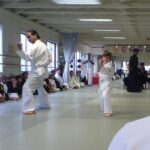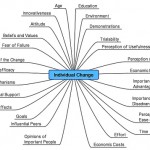When you have eliminated the impossible, whatever remains, however improbable, must be the truth. – Sir Arthur Conan Doyle, stated by Sherlock Holmes

From the curve of the wall and the shape of the tile, it is likely a subway station. From the graphic, I must say, this is the Baker Street station of the Tube. It’s elementary, when you think about it.
What does that mean?
To me, this is all about logic. If you start with everything you can think of, and then eliminate those that are impossible, you are well on your way to a solution.
That’s the first stage of solving any mystery, whether it’s a murder mystery in a book (or TV, or movie, or…) or something you expected to work, but didn’t. You have to eliminate all the things that it couldn’t possibly be, or you will have too many distractions.
Once we clear out all the distractions, we can focus on what remains. Sometimes what is left is easy to believe, other times it can seem highly improbable. However, with the impossible eliminated, what remains are the only possible solutions. And one of them must be the truth.
Why is clearing out the impossible solutions important?
Sometimes, it can be hard to solve a challenging situation even under the best of circumstances. A problem with lots of shiny things to look at can be distracting, and waste a great deal of our time.
While some impossibilities might be obvious, sometimes we can be sucked in by an idea that intrigues us, despite being impossible. Other times, it is only in close examination that the impossibility is revealed.
However, once we clear the clutter by removing all that is impossible, we are left with an easier solution. Gone are the impossibilities, both obvious and subtle. What is left can be gone over more quickly, and evaluated for probability or even likelihood.
This may be an iterative process, starting with the really obvious impossibilities, and then moving to the shiny distractions. Finally, as we work our way through the last of the options, we may still find ourselves weeding out additional impossibilities.
Where can I apply this in my life?
When trying to answer “why?” how often do we find ourselves distracted by answers that end up being impossible? While an occasional flight of fancy can be refreshing and fun, it can also eat up a lot of time.
I don’t know about you, but for me, time is one of the things I can least afford to waste. Besides, there’s a certain elation in solving things quickly, right?
How often do you attempt something, but it doesn’t come out quite the way you wanted? If it isn’t happening to you at least some of the time, you may be working too far inside your comfort zone, right?
When things don’t go the way you expected, it’s time to figure out what went wrong, why it did what it did, and how to do it better next time. That starts with eliminating all the impossibilities, and narrowing down the remaining possibilities, in an effort to hunt down the truth.
Think about something that didn’t go well for you. Grab some paper and write it down. Now ask yourself “Why?” and write those answers down as well. Start digging and brainstorm up all the ideas of which you can think, and add them to the list.
Now look at your list. What answers can you eliminate as impossible? Alien intervention? Solar flares? Ok, so those might be a bit obvious for most cases, what other possibilities can you eliminate from the realm of possibility? Look at your list and discard immediately anything that is impossible.
What is left after the first cut? Take a look at what is left and consider how you want to divide the remainder. Split them into two groups, three, five, whatever suits you. Divide the remaining ideas into the groups based on relative probability, and begin with the least likely.
Look for situations that could eliminate this as a possibility, and cross it off as soon as you find one. Personally, I move fairly quickly on the first pass, and only dig deeply as I go into subsequent iterations. The objective is to shorten the list as quickly as possible.
Once I have the list down to a few high probability ideas, I chose one and dig until I’m certain I have a valid answer, or I prove it impossible. Depending on how thorough I need to be, I may run through the whole list and get all the possible reasons (sometimes there are many paths to a disappointing result). Other times, just one will be sufficient.
How do you figure out what to do after something goes in an unexpected and unpleasant direction? Ask yourself “Why?” and then start eliminating the impossible.
“When you have eliminated the impossible, whatever remains, however improbable, must be the truth.” It’s simply elementary, my dear reader. 😉
From: Twitter, @White_Roses10
confirmed at : http://www.brainyquote.com/quotes/quotes/a/arthurcona139299.html
Photo by ell brown
Happy Birthday to Sir Arthur Conan Doyle, born 22 May, 1859.







Pingback: Week 9 – Juneta's Master Key Experience Journey
I had Diabetes Type 2 and Psoriasis, when I treated my Diabetes, my Psoriasis went away…I asked WHY. And found Sugar was connected to both, which led me to research Leaky Gut, Gut Bacteria, Fungal Overgrowth, Autoimmune Disorders, Inflammatory Problems, and Metabolic Disease. PLEASE look these up and try healing your own immune systems.
Interesting series of events. I haven’t had any of those problems, but my wife had an issue with an artificial sweetener in college, which she found by slowly eliminating possibilities.
There are many things we ingest today which probably aren’t all that good for us. There are also variations and levels of sensitivity which vary from individual to individual. I’m glad you found some relief from your issues.
Thanks for sharing your story.
Pingback: The Pirate of Portsmouth’s Tale | mattstale
Pingback: Wisdom is not obvious. You must see the subtle and notice the hidden to be victorious. | philosiblog
Pingback: Knave’s Obsession | freethoughtbox
Pingback: So what is the aim of this blog? | Principia physica
How would you apply this to science and the scientific method?
Easily. Just ask Nicolaus Copernicus how he came up with the Heliocentric model. He couldn’t make his observations work with any form of Earth-centered model. He started with all the known theories, and disproved them one by one. That’s the test the theories by trying to break them part of the Scientific Method. When he was out of ‘conventional logic,’ it was time to go where the data took him. He then published his work, and let others take observations and confirm or disprove his theory, which, again is the scientific method.
Eventually, the basic methods were used to help prove Einstein’s General Relativity. Mercury wasn’t behaving according to the known laws of physics. That had been known since the mid 1800’s. But no one could explain it, until the theory of curved space-time was applied. Then things matched nearly perfectly. There were tons of theories over the years, but all failed for some reason or another. For now, General Relativity matches almost perfectly, and is the agreed on solution, until something better comes along.
Consider medicine. Not exactly the best examples of the Scientific Method, but medicines, treatments, and the like go through tests, and sometimes, you’re left with really odd results. Using leaches in crushed tissue injuries wasn’t something they went looking for, but it works remarkably well. You go where the results are, and drop the avenues of research that aren’t working.
I hope that helped. If I missed your point, please rephrase the question and ask again.
Many thanks for this. I understand perfectly. I only ask because I am starting an essay on the philosophy of science entitled “Did Karl Popper get science’right’?” and I came across this saying from a friend.
Great! Since the question would remain, I thought I’d give it a fairly thorough answer, so the next person to see it would have something to consider.
Popper has some interesting thoughts, but falsification isn’t terribly robust, and only applies to the small percentage of problems which can be falsified. For instance falsification is pretty much useless in the search for a cure for cancer. For more theoretical, rather than practical, fields, it has a bit more use. However, I put my faith in something that works all the time, not just for special cases.
Pingback: تشکیک و تیقن » فراز تیرے جنوں کا خیال ہے ورنہ - عدنان مسعود کی سخن آرایاں۔ دروغ برگردن قاری